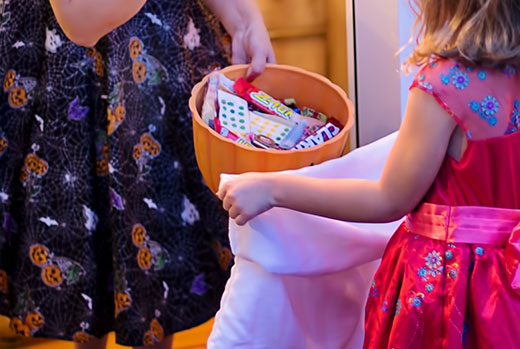
Designate one person to hand out Halloween treats to reduce the risk of spreading COVID-19 or other viruses.
K-State expert shares Halloween food safety tips
Holiday treats shouldn’t become an unwanted trick
Sept. 30, 2020
MANHATTAN, Kan. – For most kids and adults, Halloween can be a sweet treat, but Kansas State University food safety specialist Karen Blakeslee says “it’s important that you don’t get tricked.”
“It’s still okay to go out and celebrate the fun part of this holiday,” said Blakeslee, who also is coordinator of the university’s Rapid Response Center for food science.
She notes that physical safety has always been a priority during Halloween as kids and parents ramble through neighborhoods collecting goodies. “But this year, safety includes our health and reducing the spread of COVID-19.”
“It’s tempting to dig into treat bowls for a tasty Halloween treat when you’re out trick-or-treating,” she said. “But this year, resist that temptation and let treat givers put treats out in goodie bags instead.”
“When out visiting neighbors in your Halloween parade, wear your festive masks and travel in small groups, but when you’re home, wash your hands before you taste your treats. All treats should be individually packaged to reduce contamination to the food.”
Blakeslee publishes a monthly newsletter that addresses timely food safety topics. The October edition features specific guidance for trick-or-treaters, including:
- Follow your community guidelines for avoiding the spread of the COVID-19 virus. This would include avoiding crowds and parties, washing your hands and wearing a face covering. “The look of face coverings may be quite creative this Halloween,” Blakeslee said. A costume mask however, is not a substitute for a cloth mask.
- At home, designate one person to hand out treats. Make hand sanitizer available for those who come to your door.
- Consider a Halloween drive-by parade in the neighborhood.
- Have a neighborhood scavenger hunt to find Halloween decorations.
- Have a pumpkin carving or decorating contest at home. Top the event off with a Halloween movie night.
“There is no need to wipe down or clean treat packaging,” Blakeslee said. “There has been no evidence that packages of any kind transmit COVID-19.”
She added that for surfaces or packages to be a problem, many unique events must occur, including a large amount of the virus present and able to survive long enough to result in spread; and the individual would have to forget to wash their hands and then touch their face after contacting the virus on a given surface or package.
“The few studies done on this issue involved the use of high amounts of the virus, much more than what happens in a real world situation,” Blakeslee said. “And while it proved the virus can stay alive on surfaces, it did not prove transmission.”
“The best step is to always wash your hands frequently, and especially before consuming food and drink.”
